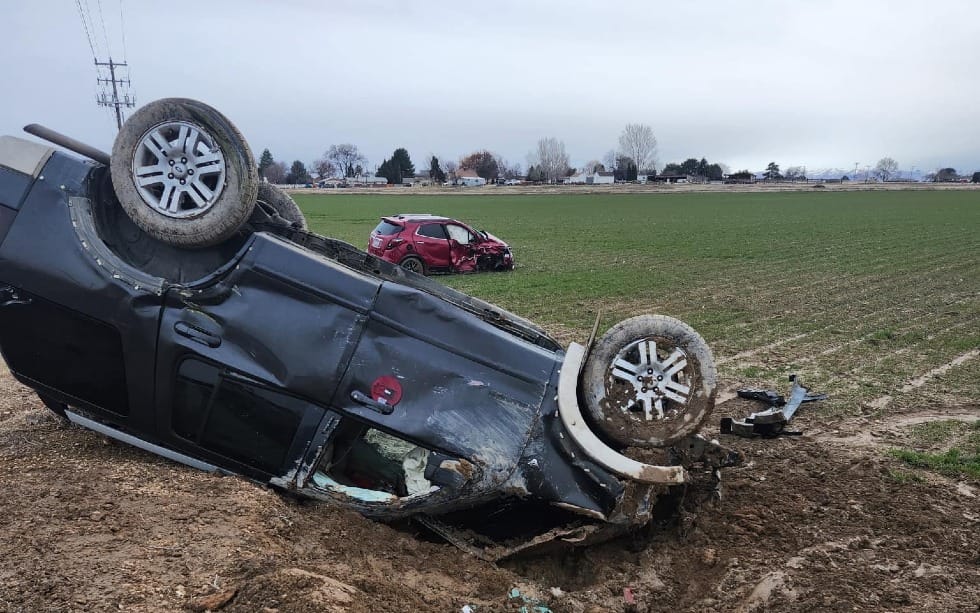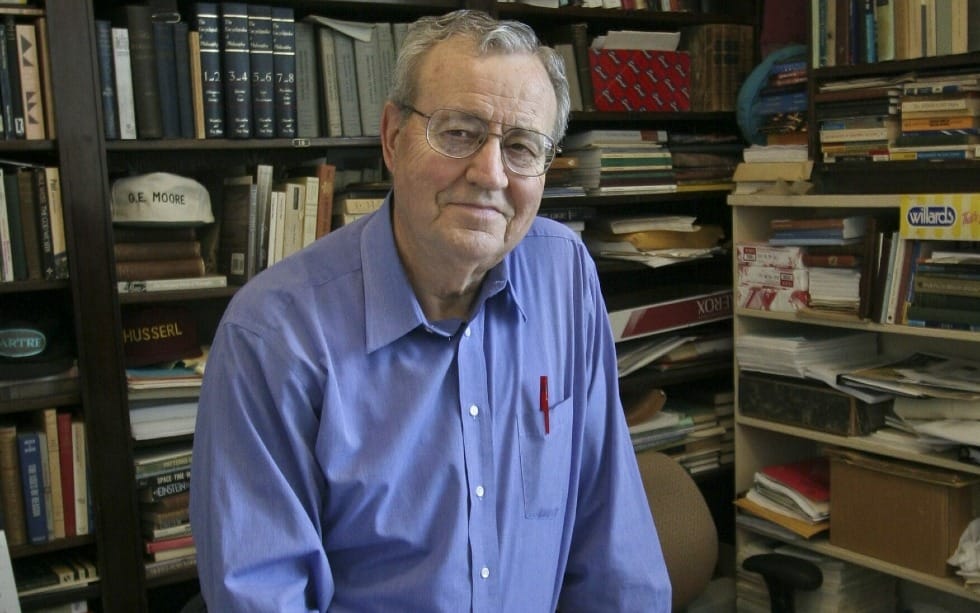How a Car Crash Can Reveal What's Most Important
To "seek first" is to prioritize our relationship with God above all else. It's recognizing that, like a wheel, God is the hub that holds the spokes of all other relationships.

"When something major happens in your life, I feel like it peels back a whole new layer of your relationship with God, or opens up a whole new depth."
These were words my sister-in-law Faith shared with me after a recent traumatic car crash. Driving at 55 MPH, she barely had time to blink when another car pulled out in front, causing her and her four kids to plow into the side. After several rolls, her car ended up in the ditch and...well...you see the picture above.
Miraculously (a truly good use of the word), Faith and her four kids were safe. After her car came to a stop, she kicked out the window and, along with some help from others, got all the kids safely unbuckled and out of the car–all with minor injuries.
While terrifying, moments like this bring tremendous clarity about what's most important. As Faith shared, "God gave me this great sense of peace right when we first crashed into the other car and were rolling over. I’m constantly telling the kids that no matter what happens, God is with them, whether bad or good, and I think those words I used to reassure them were at the forefront of my mind at that moment."
She adds, "So many things happened surrounding the accident that could only have been orchestrated by God. From a friend of mine being two cars behind me because she felt like God wanted her to go home a different way that day to the person I handed little two-year-old Emmy to, who was a pediatric emergency room doctor. I kept thinking of the Bible verse in Psalm 91:11: 'For he shall give his angels charge over you, to keep you in all your ways.'"
It was providential that Faith had been memorizing Psalm 46:1 with her kids the week leading up to the crash. As you might know, this verse says, "God is our refuge and strength, a very present help in trouble."
So, why do I share this story?
Because Near-Death Encounters Remind Us of What's Most Important
Several years ago, I read a book by John Ortberg titled Soul Keeping. Near the end, John tells the story of his friend and mentor, Dallas Willard. As someone near the end of his life, Dallas was going through a series of health complications that made each new day more difficult than the one before. Life was hard, and conversations couldn’t help but drift to talk of death and eternity.

As they chatted, Dallas made a comment that took John off-guard. “I think that, when I die,” he said, “it may take some time before I know it.”[1] John wasn’t sure how to respond, but Dallas went on to make the following profound statement:
A person, Dallas said, is essentially a collection of conscious experiences. Far more than just bodies or just appetites, we are our experiences. That’s why we treasure the good ones so — a beautiful sunset, a favorite scene in a movie, a first kiss, a dramatic victory. This conscious experience of life, Dallas said, will go right on uninterrupted by death. Jesus put it so strikingly: “The one who trusts in me will never taste death.”[2]
To Dallas, there wasn’t this grand divide between this life and the next. There was interconnection and this sense that God was using his time on earth to prepare him for the life to come. This gave each moment, each test of character, and each wonderful high or terrible low tremendous meaning.
God wasn’t an abstract concept. He was knowable, personal, and relatable. Thus, the afterlife would be a natural transition from one experience to the next.
I’ve often thought of Dallas’ words because they directly oppose how many live and how my mind naturally operates. Just the idea of knowing God at this level is thought to be either arrogant or foolish. But if it is true, our greatest desire in life should be to have a relationship with him so strong that eternity feels like a natural transition.
But Is This Even Possible?
Jesus demonstrated that it was and is. He said in John 17:3, “This is eternal life: that they may know you, the only true God, and the one you have sent —Jesus Christ.”
This love Christ wants us to have is relational, not slave-driven. It’s intimate, not distant. It’s available, not unattainable. It’s liberating, not constraining. It’s life-giving, not rules-oriented.
Our primary duty in life is not to "be productive" and climb the ladder of success. It's to know God. It’s to sit with him, spend time with him, and converse with him.
Last week, I was reading Henri Nouwen’s Spiritual Formation, when I stumbled across this wonderful line. He writes, “The world says, ‘If you are not making good use of your time, you are useless.’ Jesus says: ‘Come spend some useless time with me.’”[3]
The real problem in life isn’t God’s distance. It’s our distraction.
Everything tugs at us to push our relationship with God to the back burner. And like a gentle Father, God isn’t pushy. Instead, he offers us a kind invitation. In Matthew 6:33, he says, "But seek first the kingdom of God and his righteousness, and all these things will be provided for you."
To "seek first" is to prioritize our relationship with God above all else. It's recognizing that, like a wheel, God is the hub that holds the spokes of all other relationships.
Don't wait until a close call happens to develop your relationship with him. Start today by “wasting” an intentional part of your day in prayer with him. Make him your refuge and strength and lean on him as your "present help in trouble."
[1] John Ortberg, Soul Keeping (Grand Rapids, MI: Zondervan, Kindle edition, 2014), 184.
[2] John Ortberg, Soul Keeping (Grand Rapids, MI: Zondervan, Kindle edition, 2014), 184.
[3] Henri J. M. Nouwen, Spiritual Formation: Following the Movements of the Spirit (New York: HarperCollins, Kindle edition, 2010), 19.





